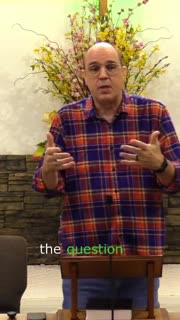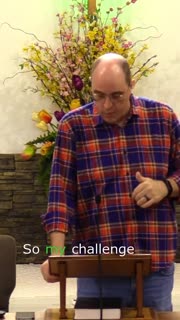Guarding Against Subtle False Teachings in Faith
Devotional
Sermon Summary
Bible Study Guide
Sermon Clips
### Quotes for Outreach
1. "Growing up, perhaps you were like me. Saturday morning, what was it? Saturday morning was cartoon day. I'm the only one that watched cartoons? Nobody else in this church did? Okay. What was funny about cartoons was every time you saw a cartoon, you knew the good guy from the bad guy, right? The good guy had a white hat, big eyes, bushy tail. The bad guy had a black hat. You knew who to cheer for. That bad guy was so different from the guy with the white hat. The black hat was different from the guy with the white hat, so you knew that troubles are going to come, situations are going to rise, but at the end, the good guy is going to win." [05:58]
2. "Every time I talk to people and I've experienced this in my own life, are you fighting the devil? People always think that, 'Oh, if I'm fighting the devil, I'm not fighting the devil. I'm not fighting the devil. I'm not fighting the devil. He's going to show up in front of me all in red with a pitchfork and horns and a tail. I know that's the devil and I'm going to fight.' Has anyone ever seen the devil like that besides cartoons? No. The devil never shows himself up that way." [11:57]
3. "The question that I get most often asked as a pastor from people that are not believers is, 'How come there are so many churches? Why can't you guys just get together and do one church?' That's a valid question, isn't it? Why not just come together? You guys say you worship the same God. You guys believe in the Trinity. Okay, worship styles may be a little bit different, and I know that some churches are way more lively than us. Some are even more traditional than us, so we meet somewhere in the middle. But how come there isn't one church where all believers can come together and say, 'This is what we believe and we want to gather together.'" [10:23]
4. "We live in a culture today that is uber individualistic. You don't have to leave your house to buy groceries anymore. You don't have to leave your house to get your favorite meal delivered to your door. You don't have to leave your house to pay your bills. You don't have to leave your house basically for anything. I'm not sure if there's a barber that comes to your house yet. Yes, there is? Okay. But sometimes you have to leave the house. Gas up? Well, why do you need to gas up your car if you're not leaving your house anyway?" [30:44]
5. "So my challenge to you this morning is, as the summer season begins, reach out. Connect with those who are around you. Connect with that person that you haven't connected in a while. And not because the pastor told you so, but because it's organic. Because you want to reach out because of the love of God that we have inside each and every one of us ought to come out, ought to overflow." [37:26]
### Quotes for Members
1. "Jude is warning this church. You say, listen, the bad guys have already infiltrated into the church and they're saying something that is not gospel related. What they're saying is not actually true. What they're saying is not correct because they have already infiltrated and they are amongst you. And what is happening now, the church, because they're not taking precautions, because they're not worried about this, these people have infiltrated and they're saying something that is contrary to the teachings of the apostles, the early fathers, and above all, teachings from Jesus Christ." [05:58]
2. "The interesting part is that when this happened, this church was not on its toes when it came to dealing with this. That's why the urgency of Jude to write this letter said, 'Hey, listen, I wanted to talk to you about God. I wanted to talk to you about salvation. I wanted to talk to you about the blessings of Jesus, but I have to address this first.' I want to contrast this to, for example, the church in Ephesus where Jesus talks to them in Revelation chapter two. And this is Jesus talking to the church in Ephesus, which was the church in Ephesus, the church at about the same time that this group of believers were around." [13:35]
3. "So the question for us this morning is, are you truly a believer, or are you saying, 'You know what, I come to church Sunday morning. I like coming here. Everybody greets everyone. Everyone is nice. Everyone smiles. Everyone is well dressed, good looking.' But are you a true believer? Are you someone who can say, 'You know what, whatever it costs, I will follow you,' and not use this grace of God that God has given to each and every one of us to say, 'You know what, I'm saved, so let me steal a bank tomorrow morning.'" [22:10]
4. "How do you guard the faith? How do you keep the true faith? Three points for you to take home, and that is read his word daily. When Paul visited the church, what did they do? They examined everything through the scripture. If it doesn't align with the word of God, it is automatically wrong." [23:57]
5. "We are living in a very individualistic time. And this is the time for us as a church to step out of the culture and say, 'You know what? We want to have fellowship with one another.' And not just to defend the faith, not just to talk theology, not just to argue with one another, but just to come together and say, 'This is the time when we want to gather.'" [35:48]
Ask a question about this sermon
1. "Growing up, perhaps you were like me. Saturday morning, what was it? Saturday morning was cartoon day. I'm the only one that watched cartoons? Nobody else in this church did? Okay. What was funny about cartoons was every time you saw a cartoon, you knew the good guy from the bad guy, right? The good guy had a white hat, big eyes, bushy tail. The bad guy had a black hat. You knew who to cheer for. That bad guy was so different from the guy with the white hat. The black hat was different from the guy with the white hat, so you knew that troubles are going to come, situations are going to rise, but at the end, the good guy is going to win." [05:58]
2. "Every time I talk to people and I've experienced this in my own life, are you fighting the devil? People always think that, 'Oh, if I'm fighting the devil, I'm not fighting the devil. I'm not fighting the devil. I'm not fighting the devil. He's going to show up in front of me all in red with a pitchfork and horns and a tail. I know that's the devil and I'm going to fight.' Has anyone ever seen the devil like that besides cartoons? No. The devil never shows himself up that way." [11:57]
3. "The question that I get most often asked as a pastor from people that are not believers is, 'How come there are so many churches? Why can't you guys just get together and do one church?' That's a valid question, isn't it? Why not just come together? You guys say you worship the same God. You guys believe in the Trinity. Okay, worship styles may be a little bit different, and I know that some churches are way more lively than us. Some are even more traditional than us, so we meet somewhere in the middle. But how come there isn't one church where all believers can come together and say, 'This is what we believe and we want to gather together.'" [10:23]
4. "We live in a culture today that is uber individualistic. You don't have to leave your house to buy groceries anymore. You don't have to leave your house to get your favorite meal delivered to your door. You don't have to leave your house to pay your bills. You don't have to leave your house basically for anything. I'm not sure if there's a barber that comes to your house yet. Yes, there is? Okay. But sometimes you have to leave the house. Gas up? Well, why do you need to gas up your car if you're not leaving your house anyway?" [30:44]
5. "So my challenge to you this morning is, as the summer season begins, reach out. Connect with those who are around you. Connect with that person that you haven't connected in a while. And not because the pastor told you so, but because it's organic. Because you want to reach out because of the love of God that we have inside each and every one of us ought to come out, ought to overflow." [37:26]
### Quotes for Members
1. "Jude is warning this church. You say, listen, the bad guys have already infiltrated into the church and they're saying something that is not gospel related. What they're saying is not actually true. What they're saying is not correct because they have already infiltrated and they are amongst you. And what is happening now, the church, because they're not taking precautions, because they're not worried about this, these people have infiltrated and they're saying something that is contrary to the teachings of the apostles, the early fathers, and above all, teachings from Jesus Christ." [05:58]
2. "The interesting part is that when this happened, this church was not on its toes when it came to dealing with this. That's why the urgency of Jude to write this letter said, 'Hey, listen, I wanted to talk to you about God. I wanted to talk to you about salvation. I wanted to talk to you about the blessings of Jesus, but I have to address this first.' I want to contrast this to, for example, the church in Ephesus where Jesus talks to them in Revelation chapter two. And this is Jesus talking to the church in Ephesus, which was the church in Ephesus, the church at about the same time that this group of believers were around." [13:35]
3. "So the question for us this morning is, are you truly a believer, or are you saying, 'You know what, I come to church Sunday morning. I like coming here. Everybody greets everyone. Everyone is nice. Everyone smiles. Everyone is well dressed, good looking.' But are you a true believer? Are you someone who can say, 'You know what, whatever it costs, I will follow you,' and not use this grace of God that God has given to each and every one of us to say, 'You know what, I'm saved, so let me steal a bank tomorrow morning.'" [22:10]
4. "How do you guard the faith? How do you keep the true faith? Three points for you to take home, and that is read his word daily. When Paul visited the church, what did they do? They examined everything through the scripture. If it doesn't align with the word of God, it is automatically wrong." [23:57]
5. "We are living in a very individualistic time. And this is the time for us as a church to step out of the culture and say, 'You know what? We want to have fellowship with one another.' And not just to defend the faith, not just to talk theology, not just to argue with one another, but just to come together and say, 'This is the time when we want to gather.'" [35:48]









